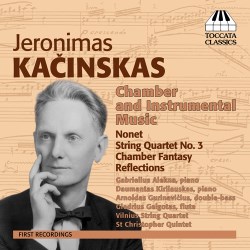|

Support us
financially by purchasing
this disc through MusicWeb
for £10.50 postage paid
world-wide.

|
Jeronimas KAČINSKAS (1907-2005)
Nonet for woodwinds and strings (1932-36) [26:05]
Reflections, for piano (1957) [15:41]
Chamber Fantasy, for flute, string quartet and piano (1981) [5:25]
String Quartet No.3 (1993) [11:53]
Vilnius String Quartet (all except Reflections)
St Christopher Quintet (nonet)
Arnoldas Gurinavičius (double bass: nonet)
Gabrielius Alekna (piano: Reflections)
Daumantas Kirilauskas (piano: Fantasy)
Giedrius Gelgotas (flute: Fantasy)
rec. October 2007 and March 2009, Lithuanian National Philharmonic Hall
TOCCATA TOCC 0169 [59:22]
Lithuanian
composer Jeronimas Kačinskas spent the second half of his long life in
exile in America. A piano and viola student, he pursued an innovative
route in 1929 when he travelled to Prague to study composition under
Jaroslav Křička. He then took further instruction from Alois Hába,
whose microtonal experiments proved highly influential on the younger
man. On graduation in 1931 quarter-tone usage was part of Kačinskas’
musical armoury. This he was to demonstrate after his return to
Lithuania and renewed composition, albeit life was a struggle and his
conducting and teaching aspirations were to some extent thwarted.
The four works programmed here are drawn from his
chamber and instrumental music and are all heard in premiere
recordings. The Nonet is the most immediately arresting and notable of
the pieces. The first three movements were completed in 1932 and one
can hear Hába’s influence in Kačinskas’ confident handling of atonality
and also his cultivation of piquant textures. The first performers of
the work were the members of the Czech Nonet, then and now amongst the
greatest such ensembles; string quartet and flute, oboe, clarinet,
bassoon and horn. The opportunities for colour and moreover for rapid
characterisation are clear, and we move from a tense, uneasy, quite
unstable opening via a fascinatingly contoured Allegro
Moderato
to the pawky fanfares and independent lines of the third movement. This
was also the finale at its early performances even though a fourth
movement was added in 1936, which Hába successfully argued should be
played independently. One can hear that the language is somewhat
different.
A generation separates the Nonet from Reflections,
a four-movement work for piano, composed in 1957. The tenor of the
music has retreated from his pre-war involvement in quarter-tones and
reveals instead an enthusiasm for well-couched impressionism and for
highly congenial, appropriately scaled writing. In 1981 he wrote the Chamber
Fantasy
for flute, string quartet and piano. It’s compact at five minutes but
is clearly sectional, and arresting in many ways. Its shifting patterns
and colours attest to Kačinskas control of material and the ways in
which he can both juxtapose and fuse such material. After this comes
the 1993 Third String Quartet. In his mid-80s he shows no slackening of
skill, and here the music is once more both compact and contrastive.
The two opening movements are predominantly slow - there’s a brief
Janáček-like accumulation of tension at the end of the opening one -
and this, and the ensuing Adagio, full of
expressive intensity, perfectly prepare one for the finely-judged
release of the fantasia-finale.
The
recordings are not hot off the press, having been taped in 2007 and
2009, but they display a nuanced and structurally sensitive approach to
the works. I hope we hear more of Kačinskas, a voice well worth
hearing.
Jonathan Woolf
|



 All Nimbus reviews
All Nimbus reviews








